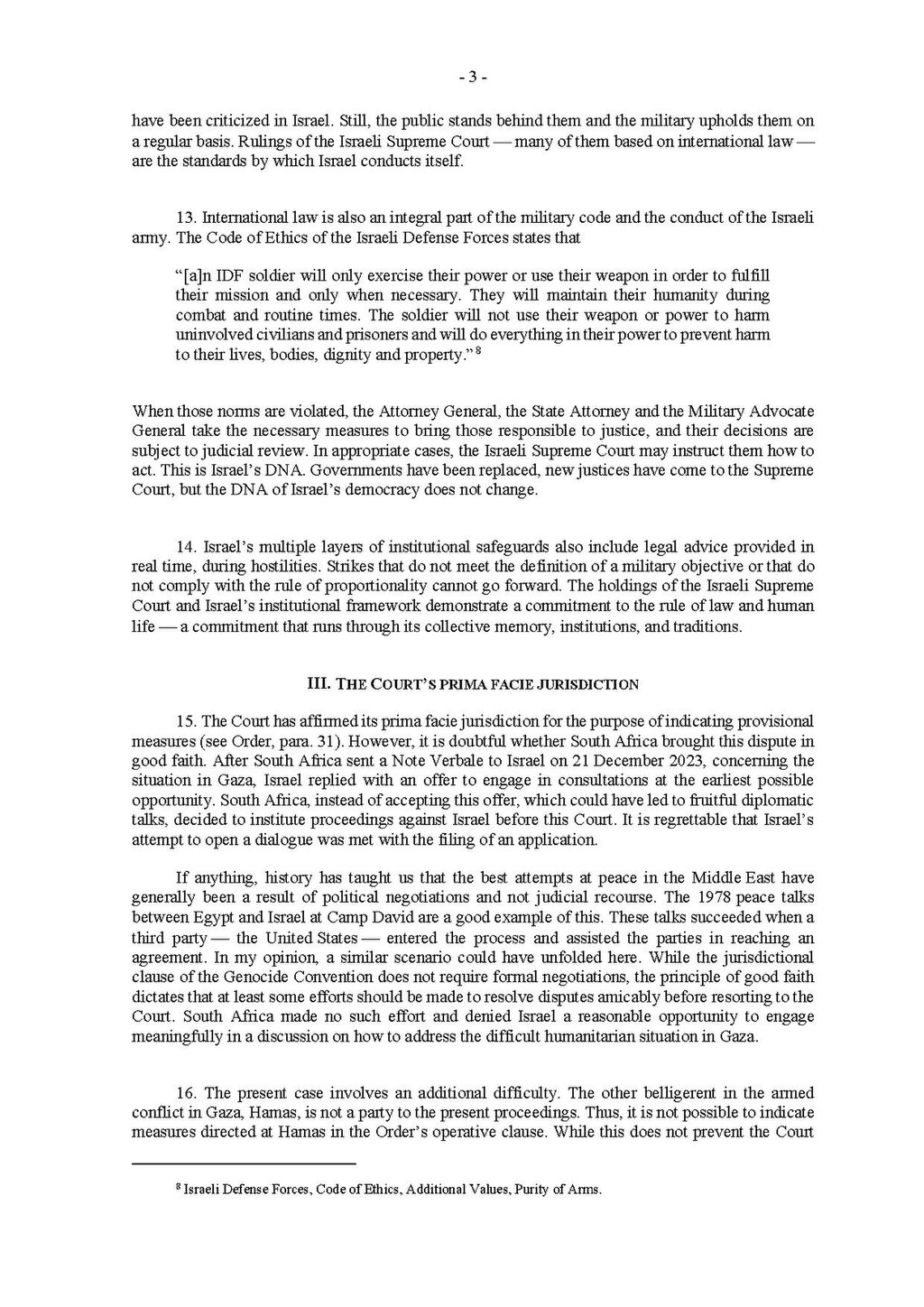- 3 -
have been criticized in Israel. Still, the public stands behind them and the military upholds them on a regular basis. Rulings of the Israeli Supreme Court—many of them based on international law—are the standards by which Israel conducts itself.
13. International law is also an integral part of the military code and the conduct of the Israeli army. The Code of Ethics of the Israeli Defense Forces states that
“[a]n IDF soldier will only exercise their power or use their weapon in order to fulfill their mission and only when necessary. They will maintain their humanity during combat and routine times. The soldier will not use their weapon or power to harm uninvolved civilians and prisoners and will do everything in their power to prevent harm to their lives, bodies, dignity and property.”[1]
When those norms are violated, the Attorney General, the State Attorney and the Military Advocate General take the necessary measures to bring those responsible to justice, and their decisions are subject to judicial review. In appropriate cases, the Israeli Supreme Court may instruct them how to act. This is Israel’s DNA. Governments have been replaced, new justices have come to the Supreme Court, but the DNA of Israel’s democracy does not change.
14. Israel’s multiple layers of institutional safeguards also include legal advice provided in real time, during hostilities. Strikes that do not meet the definition of a military objective or that do not comply with the rule of proportionality cannot go forward. The holdings of the Israeli Supreme Court and Israel’s institutional framework demonstrate a commitment to the rule of law and human life—a commitment that runs through its collective memory, institutions, and traditions.
III. The Court’s prima facie jurisdiction
15. The Court has affirmed its prima facie jurisdiction for the purpose of indicating provisional measures (see Order, para. 31). However, it is doubtful whether South Africa brought this dispute in good faith. After South Africa sent a Note Verbale to Israel on 21 December 2023, concerning the situation in Gaza, Israel replied with an offer to engage in consultations at the earliest possible opportunity. South Africa, instead of accepting this offer, which could have led to fruitful diplomatic talks, decided to institute proceedings against Israel before this Court. It is regrettable that Israel’s attempt to open a dialogue was met with the filing of an application.
If anything, history has taught us that the best attempts at peace in the Middle East have generally been a result of political negotiations and not judicial recourse. The 1978 peace talks between Egypt and Israel at Camp David are a good example of this. These talks succeeded when a third party—the United States—entered the process and assisted the parties in reaching an agreement. In my opinion, a similar scenario could have unfolded here. While the jurisdictional clause of the Genocide Convention does not require formal negotiations, the principle of good faith dictates that at least some efforts should be made to resolve disputes amicably before resorting to the Court. South Africa made no such effort and denied Israel a reasonable opportunity to engage meaningfully in a discussion on how to address the difficult humanitarian situation in Gaza.
16. The present case involves an additional difficulty. The other belligerent in the armed conflict in Gaza, Hamas, is not a party to the present proceedings. Thus, it is not possible to indicate measures directed at Hamas in the Order’s operative clause. While this does not prevent the Court
- ↑ Israeli Defense Forces, Code of Ethics, Additional Values, Purity of Arms.
